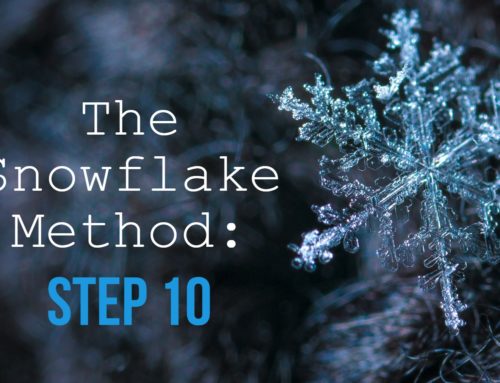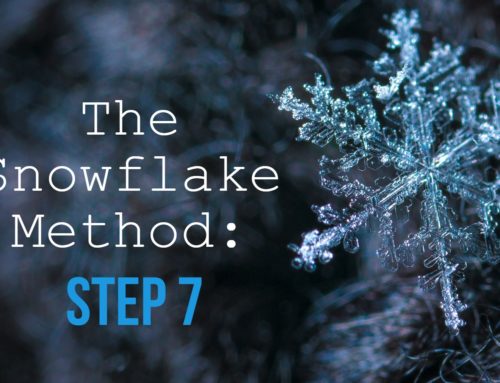Once upon a time, I described my fiction as character-oriented.
I’d bandy about that phrase in conversations with friends (or anyone, really) who asked about my writing. I used it in query letters to agents and editors while precociously comparing my early sword-and-sorcery fiction to the works of Margaret Weis, R.A. Salvatore, and other authors of books with dragons on the cover.
“Character-oriented” just seemed to be the logical expression for my work because, at the root of it all, I loved creating characters. Back when I was I writing medieval fantasy—and attending to the world building that went with it—I created countless characters to fill roles from lowly peasant to powerful tyrant across a centuries-long timeline. (Though there weren’t any invincible protagonists, I’m happy to report.)
It was an easy exercise:
Step 1: pick a name.
Step 2: pick a personality.
I spent more than a little time creating character profiles so that the people who populate my stories transcended a mere two dimensions. Because I wanted my readers to understand the characters and to see them as clearly as I did.
I also wanted readers to care about them.
In fact, I’m confident I said this very line at writing workshops in college: “If I don’t care about your characters, I won’t care what happens to them.”
These days, I don’t know if would use “character-oriented” to describe my fiction. I look back at The Renegade Chronicles and some of my other early work, and it’s clear there was a lot of focus on the different personalities. Perhaps that’s inevitable when you write about a motley group of freedom fighters thrown together by fate and forced to get along…or die trying.
But once I turned the page from straightforward sword-and-sorcery fantasy to something more nuanced, I find most of my ideas start with “What if…?” and not “Who is…?” Inklings of the story—the plot, that is—tend to come first, though the types of people who will weather these scenarios come in at a close second.

Apathy is the enemy of every writer.
The more I think about it, the more a term like “character-oriented” seems superfluous. Characters are but one element of a story. Like setting and plot, they are essential ingredients of a story. But are they any more important than the rest? Shouldn’t a story be character-oriented, plot-oriented, setting-oriented, and so forth?
More to the point, can a reader care what happens in a story if he or she doesn’t care about the characters?
The question haunts me because I’ve been accused of creating unlikable characters. Vincent, the protagonist of If Souls Can Sleep, isn’t the nicest guy. He has a lot of problems. He treats people poorly. And the fact that something supernatural seems to be happening to him does nothing to make him a better-adjusted citizen, particularly in the short term.
Whenever a beta reader would remark how they just can’t bring themselves to like Vincent, I’d argue (if only to myself) that it doesn’t matter. My goal was to make him realistic, and, realistically, people can be jerks.
Yet I also wanted him to be relatable and maybe even sympathetic.
While it wasn’t important for Vincent to be likable, it was arguably important for people not to dislike him so much that they dismissed his fate. Apathy is the enemy of every writer. So I suppose I had a decision to make: either make Vincent utterly unlikable so that my reader roots against him or take steps to make him more likable so that they could root for him.
I confess that I did soften him up a big in the rewrite, and reducing the intensity of his bad behavior not only made him more sympathetic, but also refined his character arc. Maybe he isn’t the most likable guy, but he has enough qualities now to make the reader care what happens to him.
A similar criticism arose for the protagonist of my short story “Going Viral.” A friend and fellow writer commented, “…I didn’t feel one bit connected to Sam by the end.” Also: “As a character, I found Sam neither relatable nor empathetic…the first syllable of ‘character’ is ‘care.’”
Come to think of it, I made Quentin E. Donovan (the Quentin E. Donovan), the “star” of another short story intentionally unlikable…
But in the case of Sam and “Going Viral,” I’m willing to chalk up Sam’s shortcomings to the fact that I struggle with short fiction. I also agree with my friend when he acknowledges that character development is even more challenging within the confines of short fiction.
It raises an important question: if the rest of the story is successful, does it matter whether the reader gives a damn about Sam?
A storyteller’s only job is to con the reader into turning one more page. We can’t directly control how anyone feels about anything, though, yes, a fair amount of manipulation comes with the territory. Writers have a handful of devices at their disposal to capture and keep a reader’s attention.
I already mentioned plot, setting, and, of course, characters. We also have themes, backstory, subplots, tropes that comes with various and sundry genres, tension, pacing—in short, anything and everything that could possibly compel a reader to travel from front cover to final page.
One could argue whether or not characters are the most important aspect of a story, but few would content that it’s OK to skimp on character development. If a writer neglects the work that enables the average reader to form a connection with the protagonist in particular, the rest of the literary elements are going to have to work that much harder to hook and hold the reader.
So how exactly can an author make his characters “connectable”?
- Make us like her.
- Make us hate her…or love to hate her.
- Make us pity him. (A creative writing professor once told me you can instantly make readers pity characters by putting them in denial.)
- Make us root for him because he’s an underdog.
- Make her relatable…just like somebody we could meet on the street.
- Make her utterly exceptional…someone we could never meet in our real lives.
- Make him have big problems.
- Make him have depth.
For more advice, there’s a nice, in-depth look at how to make readers care about your characters at novel-writing-help.com.
And here’s five more tips at writersrelief.com.
Now it warrants mentioning that not every character will resonate with every reader. We all have different preferences and unique backgrounds. You can’t please all of the people any of the time, but as a writer, you should aim to please as many as possible.
And even if characters on the whole aren’t your strength, just make sure they aren’t a weakness.



This is such a brilliant piece of writing, and a very important question!
Thanks, Sarah. I hope you found it helpful in some small way.
David,
Glad I’m not a writer. Must be a hard way to make a living.
Many good points here, and you amplify well.
Guess I never thought about it all that much. Must have just come naturally. When I do a novel or short story, I drag out my photo file, which contains dozens of pix of diff men and women. “Ah, this is Karen,” I say. “This is Nate.” And away I go..
Sometimes Karen turns out to be a bitch, Nate a bastard. But before I get very far in my outline, I figure a way for them to change into at lease semi-likeable persona. Yes, the reader should be rooting for them, and hoping they will eventually shape up.
BUT to be honest, a baddie can suck in a reader just as well, and he reads on just to see the shit get run over. Trying to think of a good example, but my brain just went into sleep mode. But I think you get my point.
I’m not into describing characters at any great length. Let the reader fill in the face on his own. Oh, hell give him a jagged scar along one side of his mug. (Tell where that came from and you get a good lead on what kind of person he is.) Let the reader fill in from there.
Rambling. Signing off. Hasn’t been a good day.
Good piece. Maybe you should think about being a non-fiction writer.
And where have you heard that before?
Best,
TOM
Yes…good or bad but never boring.
Thanks, as always, for reading!
“The question haunts me because I’ve been accused of creating unlikable characters.”
From readers who perhaps think the world should be all kittens, puppies and birthday parties and escape into the realm of fiction to forget for a little while the cold, hard reality of life exists, perhaps. Fine. But for others, like me who believe “art imitates life”, then an unlikable character becomes an eminently *relatable* character. Because, let’s face it…of all of us are unliked by someone for some reason, and in my case, by many someones for a number of reasons.
I can abide by the unlikable character so long as he’s an *interesting* character. So many times I’m introduced to characters who are *so* likable they’re boring. We all have personality quirks some find endearing and others find aggravating. Shouldn’t our characters?
You just keep doing what you’re doing. I read the first part of your “Souls” here on your site and thought, “hey, this Vincent guy is a regular Joe just as messed up as the rest of us. I’d like to learn more about what he’s got going on.” And if other readers don’t like it, well there are thousands of other books more suited to their tastes out there. I’m just glad yours is suited to mine.
“Apathy is the enemy of every writer. ” Truth here. I’ve read and enjoyed books about characters I love. I’ve read and enjoyed books about characters I love to hate. And some of each were relatable and sympathetic while others weren’t. But *all* of them were *interesting*! I think it’s hard to be apathetic about a character who is interesting.
I wouldn’t put a whole lot of stock in your short story critic. Sounds like a nut job to me. 😛 That said, I can agree with your assessment how difficult it can be to develop characterization in a short fict. I’ve tried my hand at it myself:
http://mjengels.deviantart.com/art/White-Shadow-Disappointed-Short-Story-381732933
But I didn’t write this because I felt I *had* to develop my repertoire of short fiction prior to writing a novel. I did it because I *wanted* to write this piece, and I explain what artwork inspired me and how in the caption following. I’d just been introduced to the artist’s work and wanted to tender this as a token of my esteem. And you can see in the comments I had my own critics regarding characterization as well. There will always be critics, just like there will always be death and taxes. But I find many times those critics are those who’ve never done what you or I have done…writing critics who themselves are not writers–(ah, that’s the subject of discussion for another day.)
I think all of the points you made about conning the reader into turning one more page are good ones. I feel like I’ve gotten my “money’s worth” from an author (even those whose work is available for free) if when I get to the last page I’ve found the journey there to be *interesting*.
And one addition for your consideration to your laundry list of making a character “connectable”…characters who make me feel uncomfortable about myself I find very, *very* interesting indeed.
MJE
I’m sure I’ve read short stories in the past that contain characters that amaze and delight me. I know they must exist, but with so few words to work with (as a reader), it seems to me that short stories tend to be more about plot (or a plot twist) than characters. Maybe that’s more true of genre short fiction than literary short stories, though.
Or maybe I just don’t read a lot of short stories these days because I want a more sustained experience as a reader…